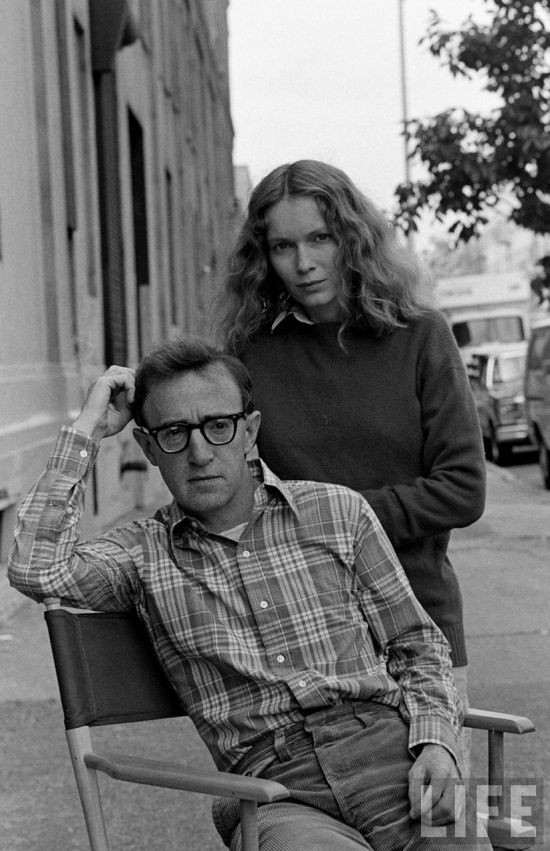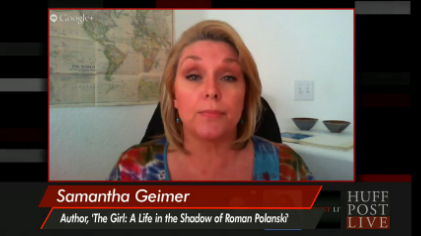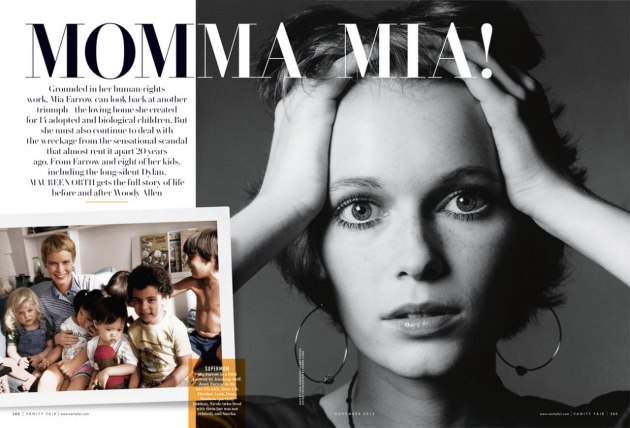I'm about to pull a Hannah Horvath and make something that's not about me entirely about me for a moment but... I had a really difficult week. As long time readers undoubtedly now, Woody Allen and Mia Farrow as artists and as a unit were largely responsible for making me the cinephile that I am today. The Purple Rose of Cairo (1985) was a major turning point in my life, the moment that I realized innately if not quite in a self-aware way, how much the movies meant to me.
 Woody & Mia in the 80s
Woody & Mia in the 80s
I will never be able to thank either of them enough for that gift. Were it not for them, and over the rest of the 80s an actress we should probably just call "Michellyl Glenn Turnstreepfer", I would not be the person I am and you would never have read The Film Experience as it would not exist.
So Allen and Farrow were a superhero duo to wee Nathaniel and their movies, events. To this day, I'd rather think of them that way. I turned up every year from 1984 (Broadway Danny Rose, my older brother drove me because he said "it looks funny") through 1992 (Husbands and Wives, their last film together) even when I had to drag reluctant family or friends. The catatrosphic end of their relationship -- there's no other word for it -- drove Farrow away from Hollywood and thus tarnished her justified place in film history (I hate how often I've had to explain her career/celebrity/talent to people over the years) and permanently tarnished Woody's own reputation; no one who has ever been accused of child molestation, whether or not they are convicted (and Woody was never even charged), is ever presumed innocent again. [more...]
As for me, I will always opt for separating the art from the artist. I wish more people could take the advice of Roman Polanski's victim Samantha Geimer, who urged us to do this when speaking out on the Woody Allen topic very recently to Huffington Post.

Either you’re going to say you separate the art from the artist or you’re not. If you don’t like his movies and they creep you out, don’t see them. If you don’t like him, don’t see his movies.I think it’s kind of a personal choice, what you spend your money on. I don’t think anybody has a place to forgive him but his own family. As far as a public boycott, I think we should save that for public corporations that are doing harm, not artists who make movies.
I have to separate the art from the artist in the case of both Woody Allen and Mia Farrow, neither of whom have (to me) ever come off well in regards to the subject of Dylan Farrow, but who have made indelible contributions to the world of cinema and comedy and cinema and humanitarian endeavors, respectively. I've heard people on the internet boasting on various websites and on twitter that they can't even think of the name of a Woody Allen movie, as if cultural ignorance is a badge of pride, or that they'll never watch one of his movies again, as if boycotting a huge swath of modern cinema will somehow ease Dylan's pain.
This is glibber than I feel but there is truth to it:
Oh jesus. You're not a hero if you stop watching Woody Allen movies. Take that self-congratulatory righteousness and donate to RAINN.
— Vincent Scarpa (@vincentscarpa) February 1, 2014
And here is how to donate to RAINN if you'd like to... which is undoubtedly a better use of your resources than condemning Woody Allen or Mia Farrow (whichever "side" you're on, if you've felt the need to choose one).
I was publicly attacked on twitter recently by someone I was once online-friendly-with for merely suggesting that people ought to know facts before they passed judgment. I was concerned that people were forgetting that "innocent until proven guilty" is the backbone of our whole judicial system and as much as I may feel for Dylan Farrow, I have to admit that the health of our entire nation's legal system is more important to me than her personal journey. I was very aware of this case back when it first reared up and read about it voraciously. "Reading about it voraciously" back in the early-mid 90s was much less time consuming and produced more rational responses since the internet did not provide an instant feedback loop and you had to wait it out between articles. I don't think it makes me a bad person (though some obviously do think so) to admit that I'm far more comfortable with our legal system sorting these gordian knots out than the court of public opinion.
Or as @jazzt put it recently on twitter: "are twitter and open letters the new judiciary?" If so we're all doomed. The internet doesn't really encourage nuanced thinking at least not in 140 character increments and in anything written very quickly (as the bulk of internet articles are). Binary thinking is just terrible for complex situations.
In case you missed any of they key statements articles that people have been discussing they are like so:

- Vanity Fair -the original Mia Farrow article... published during Husbands and Wives release in 1992
- The New York Times - Dylan's Open Letter about her abuse. This was published on Nicolas Krystof's blog. He is friends with Mia Farrow and Ronan Farrow.
- The Daily Beast - Robert Weide attempts to clear up some misperceptions of what originally went down with the investigation and lack of legal proceedings. He is friends with (and a documentarian of) Woody Allen. (I have seen many attack on this article but I would like to note that most of the issues that people seem to take with this piece, apart from its tone, is with its opening gambit of 10 falsehoods about Woody's relationships to both Mia Farrow and Soon-Yi Farrow Previn. This saddens me because these are all verifiable and people would do well to know of what they speak. The only non-facts listed, if you want to get technical are points #5 (how could he know about the last sentence?) and points #9 which is more of an observation of perception... but as someone who lived through the first media war, I can also attest it is basically true since I heard people saing awful and racist things about SoonYi back then.
- CNN Woody's Legal Team Statement
- The Guardian -Michael Wolff claims that the Farrow family is in the Anti-Woody business and stand to benefit from his downfall
- Hollywood Elsewhere Cate Blanchett's Statement to Jeffrey Wells at the Santa Barbara Film Festival
What still might be coming? Some people suspect Moses Farrow, estranged from his mother Mia and friendly with Woody Allen again, might weigh in but I personally doubt it*. Woody Allen's team says Woody himself will soon make a public statement.
*UPDATE (2/5/14): Wrong. Moses has come forward saying that Woody is innocent and that Mia poisoned the children against him and also beat him as a child. Dylan denies her older brother's new claims.
Naturally most of those articles are condemned by some as being "garbage" or agenda-laden, particularly since the people writing them are friendly with either Allen or Farrow and thus have career-interest in making them look good. Yet even in the "balanced" articles there is the whiff of judgement. Take Catherine Shoard's recap article on all of this in The Guardian. It's mostly just journalistic news-sharing but for the brilliantly sly way she describes the plot of Blue Jasmine at the end of the article.
The film tells the story of a wealthy New York socialite and pathological liar whose inability to control her rage on learning of her husband's infidelity leads to the whole family's downfall.
That is a skillfull and funny "Guilty!" verdict right there* cause you could just as easily describe the plot like so, i'll illustrate.
"the film tells the story of a wealthy New York socialite who is driven to madness by her husband's infidelity and criminal behavior which leads to the whole family's downfall."
...which redirects the anger at Woody as if it were written by Mia. It's also equally true.
*UPDATE (2/4/14): I have since received clarification about this from Ms. Shoard who did not intend it the way I read it. Which only further underlines the point that phrasing and multiple possible interpretations make talking about this incident and the articles surrounding it very challenging.
When I was suggesting that people think about the entire history of this case and not just one open letter 20 years later, I was told that this meant I was advocating silencing the victims. Which is a strange charge. Shouldn't we want more than one voice in any complicated situation where whole lives and reputations, and several of them, too, hang in the balance? I understand the passionate advocacy yet even here I find the rhetoric overblown. How is anyone silencing the former Dylan Farrow or even advocating silence? I don't mean to joke, but I kinda have to: If an Open Letter in the New York Times is considered silence, what is shouting?
More disheartening (at least at this very moment) than any facts -- especially since you and I will never be fully privvy to most of them -- is the angry overheated rhetoric on the internet which seems, by and large, to be arguing that the presumption of innocence until someone is proven guilty is an outdated notion that we simply have no use for. Or as Mark Harris so succinctly and smartly tweeted...
A) "Innocent until proven guilty" and "All accusations are true" don't go well together. B) I don't know. C) YOU don't know. So don't guess?
— Mark Harris (@MarkHarrisNYC) February 2, 2014
Naturally someone took offense to his sensible balancing act as well calling it 'cut from rape cloth'.
But here is the current 100% most tragic aspect of all of this given that it requires no proof of any sort and applies to any perceived truth on either side of what transpired. Whether Dylan Farrow's recollection of events from her childhood is a) 100% accurate, b) a mix of fantasy, misunderstandings, and agenda-laden misdirection/brainwashing or 3) some mix of the two... and certainly one of those three options must be true... they're all totally traumatizing. So it's impossible not to feel for her or deny that she's the victim in all of this.
Still and all, I wish that Farrow, in her personal grief, hadn't begun lashing out at blameless people who had nothing to do with her victimization. There is no need to compound the tragedy by dragging other faultless people into it. Apart from Diane Keaton none of the other people name-checked had ever even met Woody or Mia or Dylan at the time. Unfortunately the internet, in its bottomless need for drama and people, in their bottomless need to feel superior to other people, have focused on this part of her letter in which Dylan calls out Diane Keaton, Alec Baldwin and Cate Blanchett (and other celebrities who have worked with Woody Allen) and we start to get pieces like 'Ethical Dilemmas hang over the Oscars' or a wave of tasteless punditry pieces like 'Does this hurt Cate Blanchett's Oscar chances' (and no I will not link to any of those tacky articles). Dylan also (indirectly) calls out all people who have ever loved a Woody Allen movie, which is really just a step way too far.
FACT: Diane Keaton, Alec Baldwin, and Cate Blanchett, and You (if you've ever loved a Woody Allen movie) and I have nothing at all to do with Dylan Farrow's abuse as a child. Let's just stop with that nonsense, even though it's born from a place of understandable grief.
Many people on the internet this week have been, even possibly without realizing it, asking for a world in which we accept that all allegations are true (no need for laws, investigations, courts, professionals to determine veracity) and for which the result should be banishment from society and/or imprisonment. But this scorched earth desire would result in an ugly world that I think none of us would be comfortable living in and it would most certainly be bereft of a healthy artistic culture. Let me explain. Do we really want to go back to the McCarthy era mentality of the blacklist? Once you begin to banish or shame artists because of professional relationships, friendships, biological relations, associations and belief systems including "innocent until proven guilty", who is ever going to escape the all consuming fire of it? Do we also have to condemn their fans as Dylan indirectly suggests? I mean, I'm not going to suddenly start pretending I don't love The Purple Rose of Cairo, Manhattan, Annie Hall and Hannah and Her Sisters and to anybody who thinks that makes me a bad person - 'nice knowing ya!'
If Diane Keaton and Cate Blanchett should be publicly dissed for being friends or professional colleagues with Woody Allen and if Mia Farrow should be publicly shamed for staying friends with Roman Polanski and for having a brother who is in jail for child molestation, where do we stop? Where do we draw the line? When do we stop compounding the tragedy? Do we really want a world where no one who has ever been accused of a crime is allowed to have any friends or colleagues or family who can risk being associated with them. I don't even want that for hardened criminals since everyone needs people to love them unconditionally no matter what heinous things they've done.
Once people calm down -- I fear Woody Allen's impending statement will only reignite fury on both sides -- I hope I will be less lonely in the place of choosing to reserve judgment and leave the legal system and the families involved to sort this all out privately (not that some of them don't want it to be public) without the ignorant chorus of people (including me) who weren't there and who know much less about everything to interpet anything they don't like as "garbage" and the rest as "perfect truth" adding more fuel to this very sad bonfire.
As per usual Cate Blanchett seems the wisest person in the room. Her response, via Jeffrey Wells:
It’s obviously been a long and painful situation for the family and I hope they find some sort of resolution and peace.
What she said. And only that.